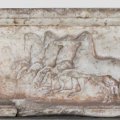A Brisbane professor will jointly lead a global study to uncover the genes that cause a common form of arthritis.
Professor Matthew Brown, from UQ’s Centre for Immunology and Cancer Research (CICR), has secured a $7 million (US$5.25 million) grant from a leading American health group to pinpoint the genes behind ankylosing spondylitis.
This condition is the second most common cause of inflammatory arthritis which affects 20,000, mainly younger Australians.
It stiffens the back, hips and pelvis and can also damage the eyes and heart.
“It’s a chronic condition which basically causes people in their 20s and 30s to be significantly disabled by their 50s and 60s,” Professor Brown said.
“The goal of the grant is to identify the genes that determine who gets the disease and also what determines the severity of the condition.
“Because this disease is so highly hereditary our program has an extremely high chance of identifying at least the major genes that are involved.
“It’s thought that it’s triggered by some very common bacterial infection.”
Professor Brown, who leads the CICR’s Muscoskeletal Genetics Group, will jointly lead a group of 15 American and British scientists working on the five-year study.
He said the only available treatment for ankylosing spondylitis was an expensive and life-long bout of potent injections which suppressed the immune system.
He said the grant, from the National Institute of Arthritis and Musculoskeletal and Skin Diseases in the US, not only raised awareness of the disease but also of Australian research know-how.
“Because this diseased doesn’t tend to put people in hospitals as much and rather causes chronic disability, it tends to have been under funded.
“This was an extremely high rated grant and its an Australian group that has pulled it off.
“A lot of people looking at genetic studies and say that it can’t be done in Australia because the National Health and Medical Research Council research budgets are relatively small.
“But you can be internationally competitive and get good funding from elsewhere if you do the right project in the right disease.”
He said some of the first work on the project was to collate the 8000 DNA samples from the US and UK together in one place.
MEDIA: Professor Brown (0421 588 581, 3240 2870, mbrown@cicr.uq.edu.au) or Miguel Holland at UQ Communications (3365 2619). *Hi-res photos available
.jpg)



